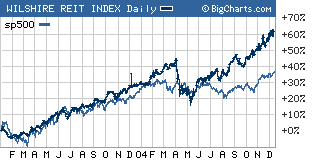NEW YORK (CNN/Money) � In the holiday classic, "A Charlie Brown Christmas," Lucy Van Pelt complains to Charlie Brown about how she never gets what she really wants.
And what is it that Lucy wants, Charlie Brown asks?
"Real estate," replies Lucy.
Who could blame her?
Just take a look at shares of real estate investment trusts (REITs), companies that own and operate properties, including apartment buildings, office buildings, hotels and shopping centers. The Wilshire REIT index is up 25 percent in 2004. That's on top of a 29 percent gain in 2003.
There's a bonus too: REITs pay out a large portion of their earnings to shareholders as a dividend in order to receive tax breaks. As a result, the average dividend yield for the 279 REITs tracked by Thomson/Baseline is 5.6 percent, compared to a dividend yield of 1.6 percent for the S&P 500.
With this in mind, REITs could very well continue their winning streak next year.
"There is a willingness in the market to pay for income," said Joseph Betlej, portfolio manager with Advantus Capital Management, subadvisor for the Ivy Real Estate Securities fund.
The REIT stuff
Of course, any time you see a sector that has enjoyed a strong run, it's reasonable to ask whether the stocks are overvalued.
But Robert Promisel, a principal with Adelante Capital Management, an institutional firm that specializes in real estate investing, argues that the stocks aren't that expensive.
Mid-cap and large-cap REITs currently trade at an average of about 14 times funds from operations (FFO) estimates for next year, according to Thomson/Baseline. (FFO is the commonly used metric of profitability for REITs -- it adds back amortization and depreciation expenses to earnings.)
 |
|
| Real estate investment trusts have enjoyed solid gains during the past two years. |
That's a bit of a premium to historical averages but Promisel thinks that this is justified since an improving economy bodes well for the group's growth prospects.
"I don't think REITs are overbought because they are on the cusp of big earnings growth. Occupancies are stabilizing so profit margins should expand and landlords are gaining pricing power so rent levels should go up," Promisel said.
Betlej agrees. He said that he specifically likes companies that own shopping malls and hotels.
"High quality retailers are chasing good locations so huge demand exists for that type of real estate," Betlej said. "And look at what hotels have done since 9/11. They've done a wonderful job of bringing their occupancy rates up."
With that in mind, Betlej said two of his top REIT picks are Sunstone Hotel Investors (Research), which owns and operates 54 hotels and has a dividend yield of 5.7 percent, and Regency Centers (Research), which owns 263 shopping centers and pays a dividend that yields 4 percent.
Hotels and retail should shine despite higher interest rates
Todd Campbell, president of E.B. Capital Markets, an independent research firm catering to institutional clients, adds another reason why he thinks hotel REITs could have a strong year in 2005: the weak dollar.
Campbell said that companies owning hotels and resorts in the United States, including Sunstone, Host Marriott (Research) and Equity Inns (Research), should see an uptick in demand as long as the greenback remains soft. That's because a weak dollar makes it more expensive for U.S. travellers to go abroad and at the same time lures European tourists to the United States.
"Think about it. Does it make sense to travel to Europe now versus going to the Grand Canyon?" he said.
Promisel also is a big fan of retail REITs. "Consumers continue to spend and retailers have an appetite for more space," he said.
According to FactSet Research, Adelante's four largest holdings were retail REITs as of Sept. 30, with big stakes in Vornado Realty (Research) (which owns office buildings in addition to shopping centers), Pan Pacific Retail Properties (Research) (which primarily owns strip malls anchored by supermarkets), and regional mall operators Macerich (Research) and Simon Property Group (Research).
The four stocks each have dividend yields of about 4 percent.
One worry for REIT investors is interest rates. The Fed raised rates Tuesday for the fifth time this year and the Fed is widely expected to keep raising rates in 2005. At some point, higher rates could put a crimp in demand for real estate.
But Campbell said that investors needn't be too worried yet since the fed funds rate, at 2.25 percent, is still relatively low, which means that more rate hikes probably won't slow down the economy too drastically.
"You have to be cognizant about rates but they're still near cyclical lows so it's still easy to justify investing in real estate since the underlying demand for the properties are strong," Campbell said. "What would really be a concern are rising rates and the economy going into a tailspin. That would be the kiss of death for REITs."

|

